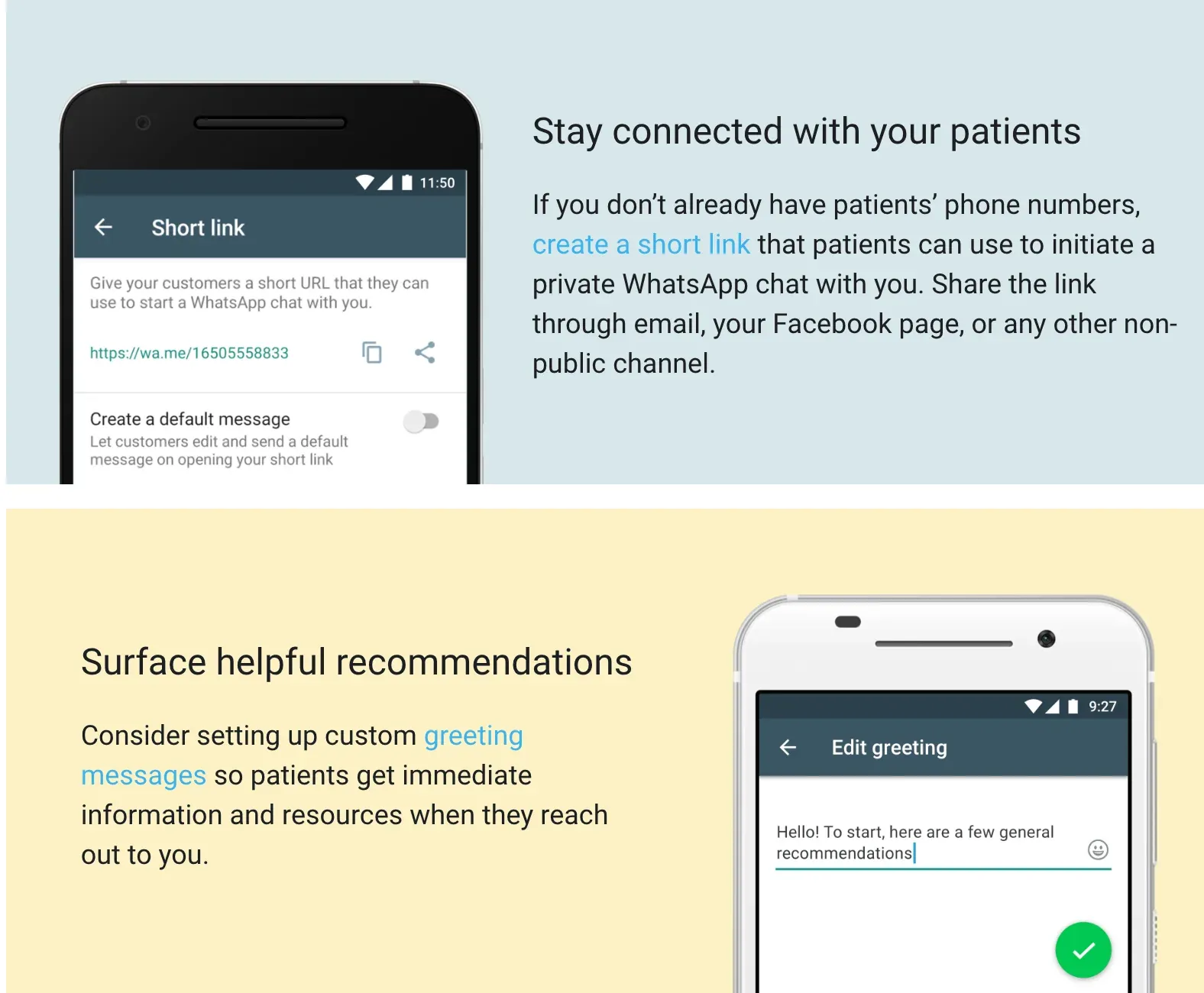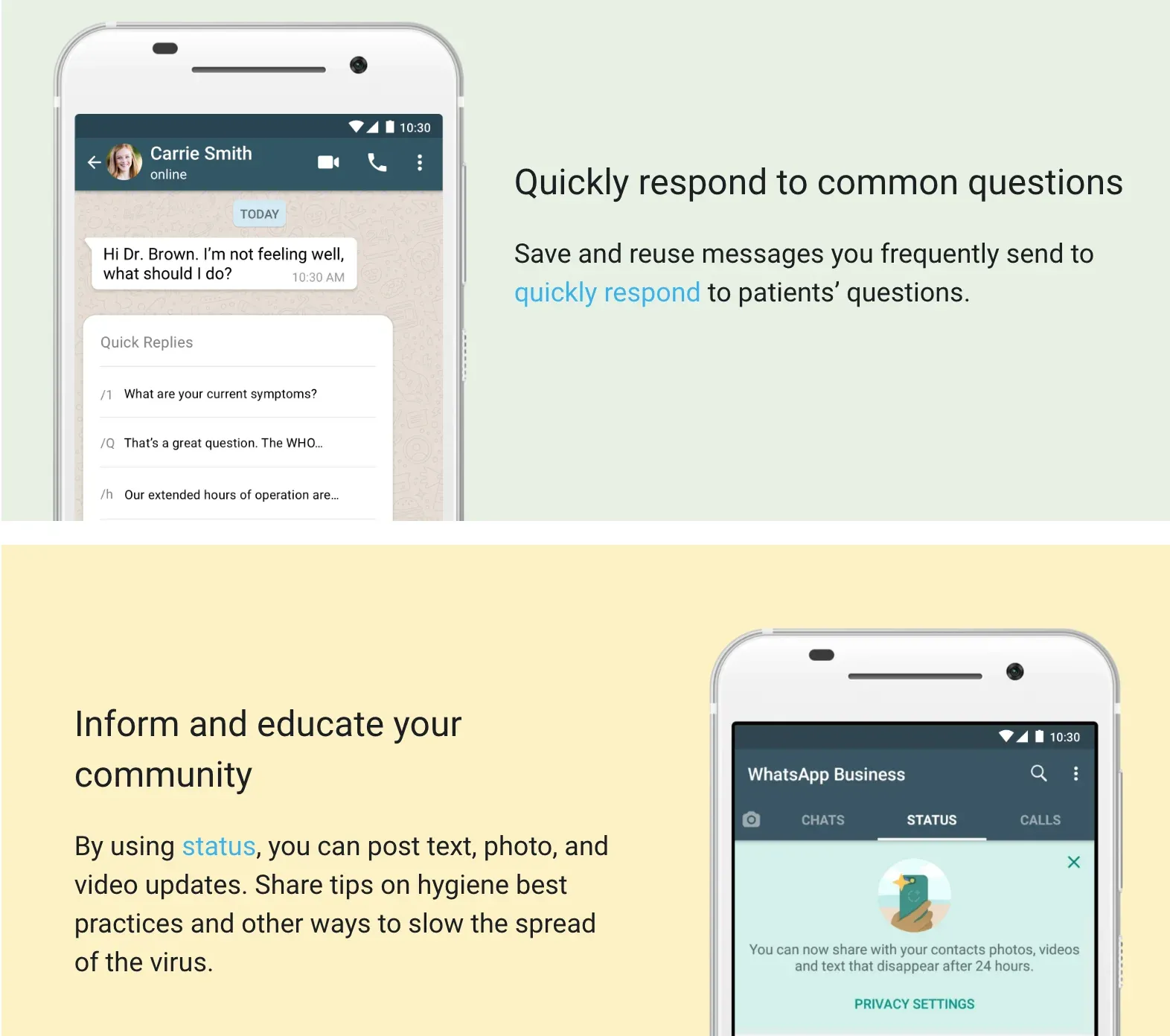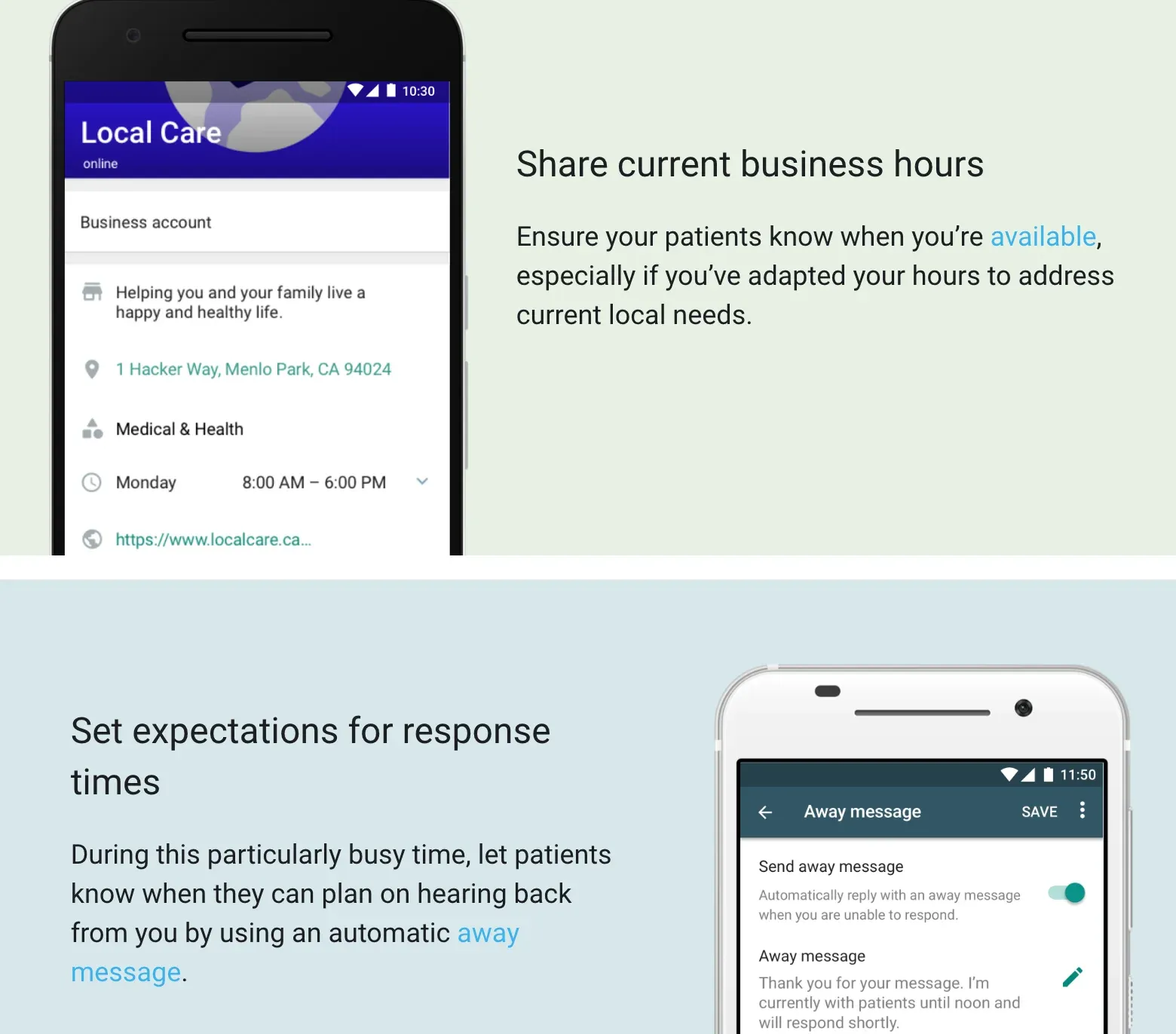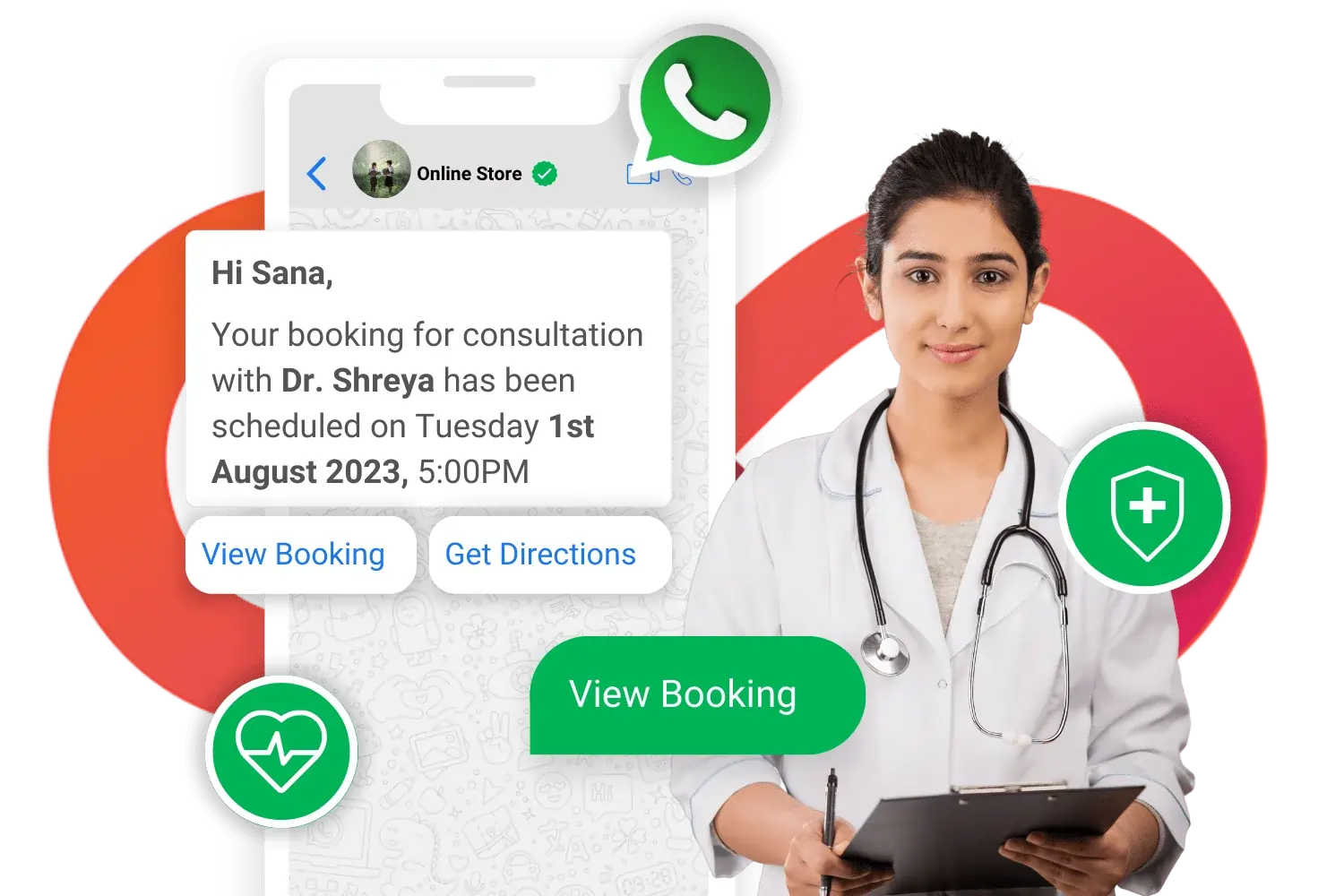WhatsApp, one of the communication platforms, is revolutionizing the way we receive medical care. Yes, there is a doctor on your phone with WhatsApp.
Using WhatsApp for healthcare isn't just convenient; it's cost-effective too. Think about all the time and money saved by avoiding lengthy travel and waiting room dramas.
With telemedicine through WhatsApp, medical advice and consultations are just a few taps away, no matter where you are.
And it's not just patients who benefit from WhatsApp in healthcare but also the healthcare professionals.
They can now collaborate across distances, discuss cases, and seek expert opinions, all within the secure walls of WhatsApp's end-to-end encryption.
In this blog post, we'll explore WhatsApp’s role in healthcare with communication features, highlighting the advantages it brings to the table like doctors' appointments on WhatsApp.
WhatsApp as a Communication Tool
WhatsApp, as you may already know, is a communication powerhouse that boasts an impressive user base of over 2 billion people worldwide.
With its text messaging, voice calling, and video calling capabilities, it's like having a personal hotline for healthcare professionals.
Let's take a closer look at how WhatsApp in healthcare revolutionizes communication in the healthcare industry.

Breaking Down WhatsApp's Communication Features
When it comes to connecting with healthcare providers, WhatsApp has got you covered.
Whether it's a quick text message to discuss your symptoms or a face-to-face video call with your doctor, WhatsApp enables easy and seamless communication.
And the best part? It's all encrypted for your privacy and security.
BotPenguin provides chatbots for different platforms, including WhatsApp, Facebook, Telegram, Website, and Squarespace:
The Advantages of Using WhatsApp in Healthcare
The advantages of using WhatsApp in healthcare are the following:
Convenience and Accessibility
Imagine this: you're feeling under the weather, but getting to the doctor's office seems impossible.
With WhatsApp, you can reach out to healthcare professionals from the comfort of your couch and book doctor's appointments on WhatsApp .
No more waiting in crowded waiting rooms or battling traffic to get a medical consultation.
Cost-Effectiveness
One of the benefits of WhatsApp in healthcare is reduced transportation costs and parking fees.
With telemedicine through WhatsApp, you can save money on travel expenses and waiting room woes.
Plus, you'll have more time for the things you love, as you won't have to spend hours commuting to and from appointments.
Multidisciplinary Collaboration
WhatsApp isn't just for one-on-one conversations; it's a collaborative platform for healthcare teams too.
Doctors, nurses, and specialists can come together, discuss complex cases, share images, and seek expert opinions.
WhatsApp for healthcare is like having a virtual medical conference right at your fingertips.
WhatsApp for Healthcare: Revolutionizing Communications
Now that we've explored how WhatsApp enhances communication, let's dig deeper into how it's transforming healthcare as we know it.
Improved Patient Engagement
WhatsApp in healthcare takes patient engagement on a whole new level of personalization. Healthcare providers can send timely reminders, follow-ups, and health education materials directly to patients' phones.
So one of the many advantages is not missing appointments or forgetting to take medications. WhatsApp keeps you in the loop and empowers you to take charge of your health.
Efficient Appointment Scheduling
Gone are the days of playing phone tag with receptionists to book appointments.
WhatsApp in healthcare simplifies the process by allowing patients to schedule appointments, receive automated reminders, and stay updated on any changes in real time.
It's like having a personal assistant managing your healthcare calendar.
Streamlined Medical Records Management
Keeping track of medical records can be a hassle, but not with WhatsApp. Healthcare providers can securely share and manage medical records through the app.
Imagine having all your health information neatly organized and accessible whenever you need it. It's like having a digital health file cabinet in your pocket.

Privacy and Security Concerns
When it comes to our health, privacy, and security are paramount.
Let's address some common concerns and shed light on how WhatsApp in healthcare ensures the safety of your personal information.
End-to-End Encryption
WhatsApp in healthcare has your back when it comes to privacy. Every message you send and call you make is protected by end-to-end encryption.
This means that only you and the recipient can access the content of your conversations.
Data Protection and Storage
WhatsApp values your privacy and takes data protection seriously. Your personal information is securely stored, and WhatsApp follows strict protocols to keep your data safe.
However, it's important to remember that healthcare providers must also follow privacy regulations when communicating through WhatsApp.
Always consult with your healthcare provider regarding their privacy policies and practices.
Securing Your Device
While WhatsApp prioritizes security on its platform, it's crucial to keep your device safe as well.
Set up a strong passcode or biometric lock to prevent unauthorized access to your WhatsApp conversations.
Regularly update your device's operating system and WhatsApp app to ensure you have the latest security enhancements.
Examples of WhatsApp's Role in Healthcare
Now that we've addressed your privacy concerns, let's explore some real-world examples of how healthcare providers are leveraging WhatsApp healthcare solutions to provide efficient and accessible care.
Remote Consultations
WhatsApp healthcare solutions are making remote consultations a reality. Doctors and patients can connect through video calls or text messages, allowing for timely medical advice and reducing the need for in-person visits.
This is particularly beneficial for individuals with limited mobility or those in remote areas.
Patient Education and Support
WhatsApp is not just about one-on-one consultations; it's also a powerful tool for patient education and support.
WhatsApp in healthcare can be used to send educational materials, reminders, and tips on managing chronic conditions.
Additionally, chatbots by BotPenguin can provide automated support, answering common health-related queries and empowering patients with knowledge with features like-
- Marketing Automation
- WhatsApp Automation
- Customer Support
- Lead Generation
- Facebook Automation
- Appointment Booking
Medication Management
Staying on top of your medication schedule is crucial for your health. WhatsApp can help you manage your medications efficiently.
Healthcare providers can send medication reminders directly to your phone, ensuring you never miss a dose.
This feature is especially beneficial for individuals with complex medication regimens or those prone to forgetfulness.

Future Implications and Challenges
As technology continues to evolve, the possibilities for WhatsApp's role in healthcare are boundless.
Let's take a look at some potential implications and the challenges that may arise along the way.
Telemedicine
Telemedicine has seen a remarkable surge in recent years, and WhatsApp is at the forefront of this transformation.
In the future, we can expect telemedicine to become the new normal.
The convenience, accessibility, and cost savings offered by WhatsApp will continue to revolutionize the way we seek medical care.
However, with this shift, ensuring the availability of reliable internet connectivity and access to smartphones will be crucial.
Integration with Electronic Health Records (EHR)
Imagine a seamless connection between WhatsApp and electronic health records (EHR).
In the future, healthcare providers may be able to integrate WhatsApp with their EHR systems, allowing for an efficient and secure exchange of medical information.
This integration would streamline patient care, improve continuity, and enhance communication among healthcare professionals.
However, maintaining data privacy and security while integrating these platforms will pose a significant challenge.
Artificial Intelligence (AI) and Chatbots
AI and chatbots are transforming various industries, and healthcare is no exception.
In the future, we may see AI-powered chatbots on WhatsApp capable of answering common health queries, triaging symptoms, and providing initial medical advice.
This would alleviate the burden on healthcare professionals, reduce wait times for patients, and increase accessibility to healthcare.
However, striking the right balance between automation and the need for human intervention will be a challenge in implementing AI-based WhatsApp healthcare solutions.
Regulatory and Legal Considerations
As the use of WhatsApp expands in healthcare, regulatory and legal considerations will come into play.
Privacy regulations, data protection laws, and compliance with healthcare standards will need to be carefully navigated.
It will be essential for healthcare providers and WhatsApp to collaborate and ensure that the platform meets the necessary regulatory requirements to safeguard patient information and maintain confidentiality.
Conclusion
We've witnessed how WhatsApp healthcare solutions have revolutionized communication, transformed patient engagement, and opened up new possibilities for remote healthcare.
Benefits of WhatsApp in healthcare are enhanced convenience, accessibility, and security features. WhatsApp has become a trusted companion for both patients and healthcare providers.
As we conclude, it's important to remember that while WhatsApp offers numerous benefits in healthcare, it should never replace traditional in-person medical care when necessary.
Always consult with your healthcare provider for personalized advice and treatment.
WhatsApp chatbots, like those powered by BotPenguin, are revolutionizing healthcare.

They enable convenient appointment scheduling, prompt symptom assessment, medication reminders, and easy access to health information.
With their integration into WhatsApp, these chatbots enhance patient experience, streamline processes, and make healthcare more accessible.
Remember, your health is your greatest asset, and with WhatsApp healthcare solutions by your side, you can have a doctor on your phone. It will be ready to assist you whenever you need it.
Frequently Asked Questions (FAQs)
How does WhatsApp contribute to healthcare?
WhatsApp plays a significant role in healthcare by providing a platform for efficient communication between patients and healthcare providers.
It enables remote consultations, patient education, medication management, and more.
Is WhatsApp secure for discussing personal health information?
Yes, WhatsApp incorporates end-to-end encryption, ensuring that your conversations are secure and only accessible to you and the recipient.
However, it's important to consult with your healthcare provider regarding their privacy policies and practices.
Can I receive medical advice through WhatsApp?
WhatsApp can be used for telemedicine purposes, allowing you to consult with healthcare professionals, share symptoms, and receive medical advice.
However, it's important to remember that WhatsApp should not replace in-person medical care when necessary.
How can WhatsApp benefit patients in remote areas?
For individuals in remote areas, WhatsApp offers the opportunity to connect with healthcare professionals without the need for travel.
This allows for timely medical advice, reducing barriers to healthcare access.
Can healthcare providers use WhatsApp for patient education?
Absolutely! Healthcare providers can leverage WhatsApp to share educational materials, tips, and reminders with patients.
This enhances patient education and empowers individuals to take charge of their health.


